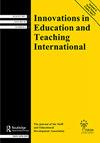生成式人工智能工具对研究人员和研究的影响:对高等教育学术界的影响
IF 4.9
4区 教育学
Q2 EDUCATION & EDUCATIONAL RESEARCH
Innovations in Education and Teaching International
Pub Date : 2023-10-15
DOI:10.1080/14703297.2023.2271445
引用次数: 0
摘要
摘要本研究探讨了在沙特阿拉伯高等教育背景下,生成人工智能工具对研究人员和研究的影响。采用在线调查问卷收集高等教育学生的观点数据(N = 505)。研究结果表明,参与者在研究中对GenAI持积极态度,并具有较高的意识。他们认识到这些工具有可能彻底改变学术研究。参与者报告了使用GenAI工具扩展项目范围和提高效率的非常有益的经验。此外,与会者对基因人工智能工具的未来作用表示乐观,期望它们变得更加普遍并改变研究格局。然而,与会者强调了在使用GenAI工具方面提供充分培训、支持和指导的重要性。伦理考虑成为一个重要的问题,突出了参与者对负责任的研究实践的承诺,以及对透明度和解决与这些工具相关的潜在偏见的需要。关键词:生成人工智能研究高等教育伦理考虑感知影响披露声明作者未报告潜在的利益冲突。数据可用性声明本研究中使用的数据和材料可应要求提供。如需进一步信息,请与通讯作者联系。abdulrahman M. Al-Zahrani,教育技术副教授,隶属于沙特阿拉伯吉达市吉达大学教育技术系。他的专长在于教育与技术的交叉,专注于教育技术领域的研究和教学。本文章由计算机程序翻译,如有差异,请以英文原文为准。
The impact of generative AI tools on researchers and research: Implications for academia in higher education
ABSTRACTThis study explores the impact of Generative AI tools on researchers and research in the context of higher education in Saudi Arabia. An online survey questionnaire was used to collect data on higher education students’ perspectives (N = 505). The findings indicate that participants hold positive attitudes and possess a high level of awareness regarding GenAI in research. They recognise the potential of these tools to revolutionise academic research. Participants report highly beneficial experiences using GenAI tools to expand project scope and improve efficiency. Additionally, participants expressed optimism about the future role of GenAI tools, expecting them to become more prevalent and transform the research landscape. However, participants emphasised the importance of adequate training, support, and guidance in using GenAI tools. Ethical considerations emerged as a significant concern, highlighting the participants’ commitment to responsible research practices and the need for transparency and addressing potential biases associated with these tools.KEYWORDS: Generative AIresearchhigher educationethical considerationsawarenessperceived impact Disclosure statementNo potential conflict of interest was reported by the author(s).Data availability statementThe data and materials used in this study are available upon request. Please contact the corresponding author for further information.Additional informationNotes on contributorsAbdulrahman M. Al-ZahraniAbdulrahman Al-Zahrani, an Associate Professor of Educational Technology, is affiliated with the Department of Educational Technology at the University of Jeddah in Jeddah, Saudi Arabia. His expertise lies in the intersection of education and technology, focusing on research and teaching in the field of educational technology.
求助全文
通过发布文献求助,成功后即可免费获取论文全文。
去求助
来源期刊

Innovations in Education and Teaching International
EDUCATION & EDUCATIONAL RESEARCH-
CiteScore
4.80
自引率
5.60%
发文量
68
期刊介绍:
Innovations in Education and Teaching International (IETI), is the journal of the Staff and Educational Development Association (SEDA) www.seda.ac.uk. As such, contributions to the Journal should reflect SEDA"s aim to promote innovation and good practice in higher education through staff and educational development and subject-related practices. Contributions are welcomed on any aspect of promoting and supporting educational change in higher and other post-school education, with an emphasis on research, experience, scholarship and evaluation, rather than mere description of practice.
 求助内容:
求助内容: 应助结果提醒方式:
应助结果提醒方式:


